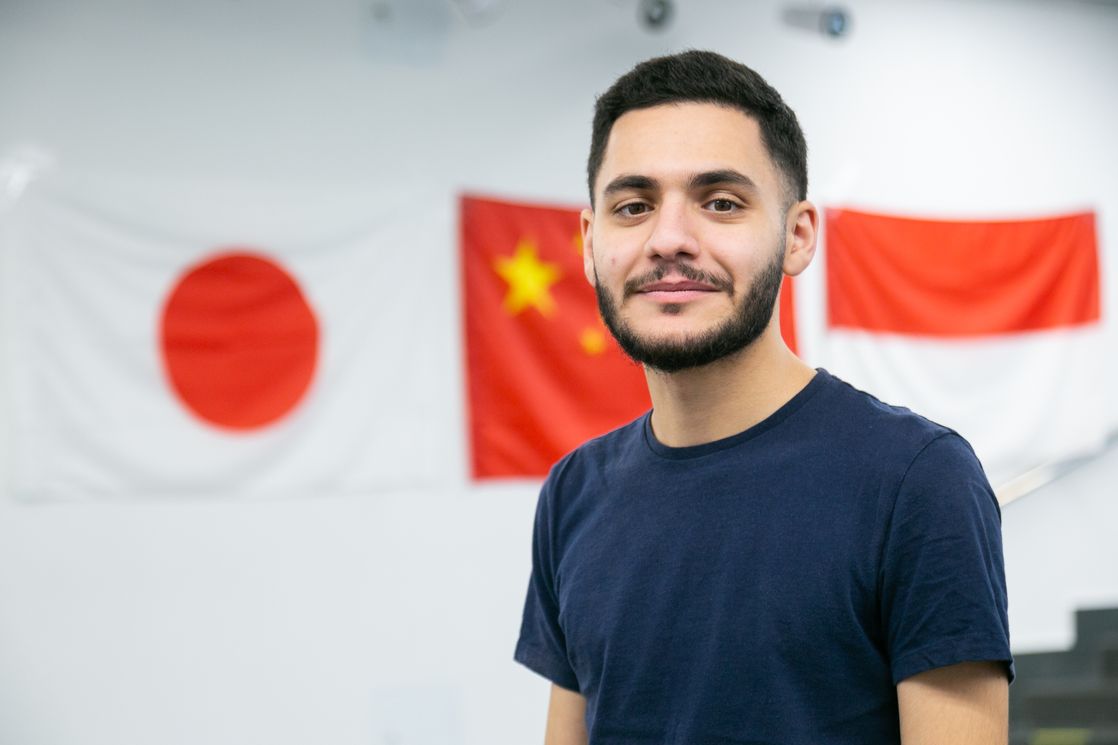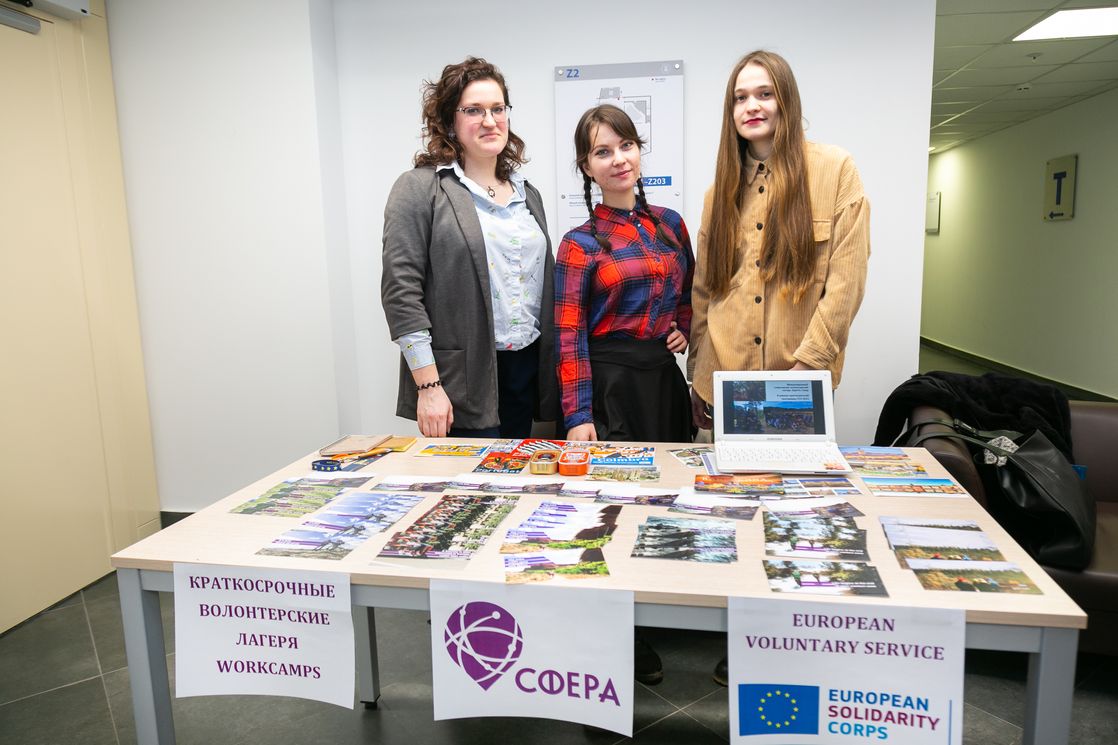Wild Travel Festival Dazzles with Hitchhiking, Volunteerism, and Dance
How can you live in Europe a whole year without spending a single euro? Is it safe to travel alone? Do you need to learn the local language of your destination if you know English? At HSE’s Cultural Centre on January 25, guests could get answers to all their burning questions about independent and off-the-beaten-path travel at the Wild Travel Festival.
Seasoned travelers and curious novices gathered at HSE’s Cultural Centre last Saturday to share and learn about international travel—from tours of Siberian villages to travel in Africa. Guests also became acquainted with HSE’s various cultural clubs and participated in ethnic dance workshops. The open event was held for the first time by the student organization, Country Study, and the Student Initiative Support Centre.
‘We want to show that there are different ways of traveling, and everyone can travel in a way that’s interesting to them,’ says Country Study founder Edgar Babasyan.

According to Edgar, Country Study members got the idea to put on a largescale event last year. ‘We hosted five public lectures about different countries. After that we decided that it would be interesting to create an event where everyone who is interested in travel—not relaxation, but experiencing something new— could gather in one place.’
The idea led to the festival’s rich and diverse programme.
Traveler Liza Chernetskaya spoke about her travels around Russia, during which she hitchhiked 7,000 kilometers. She talked about how to prepare for such a long trip, what to look out for when choosing your travel companions, and what rules should be followed when traveling with truckers. At the end of her presentation, Liza shared her main conclusion that she drew at the end of her trip.
Hitchhiking is about kindness
The guests of the event also learned about traveling for a cause. The Sphere organization presented a range of long-term and short-term international volunteer programmes in Europe that are supported by Erasmus +.
Veronika Mikhailenko volunteered in Slovakia and says it was a good experience. ‘Long-term programmes cover all your visa and flight costs, and they also give you a stipend. But students are more interested in the short-term camps. You can go during the summer without interrupting your studies, work as part of an international team, and do something useful.’

Another important topic for those gathered was how to preserve one’s travel memories. ‘We always come back with photographs from trips that are rarely reviewed by anyone. I want to help people turn their photos into something special,’ says Ekaterina Savitskaya, a Student Initiative Support Centre staff member, who led a master class on the topic.
Ekaterina explained how to make a photo book, a moodboard, or a travel book from pictures. The main thing, she says, is that when you add a little creativity, you can turn your photos into a real art object.
Ivan Kornilov and Vasily Ogurtsov came to the festival because they love traveling. Vasily, an HSE alumnus, noted that the event had something for everyone. ‘We went to the lecture, “How to Learn any Language for Your Trip”. The speaker gave useful advice: study the cultural features of the region where you are going; focus on that, rather than the whole country.’ Vasily wants to visit South America. His grandmother travels there every six months, and he has connections there. Ivan Kornilov, meanwhile, who recently returned from Asia, wants to see South Korea, a country he didn’t manage to visit during his trip.
See also:
‘In Cherdyn, It Feels Like You Have Reached the Edge of the Earth’
Dmitry Koshcheev began his journey in science back in school, but eventually chose economics and tourism over history. In an interview with the Young Scientists of HSE University project, he shared his experiences of researching the Visim neighbourhood in Perm, tourist clusters, and how he mastered analysing 300 sources a day.
HSE University Participates in Youth Hiking Tourism Development Strategy
HSE University and the project team of ‘Hikes of the First—More than a Trip’ are working on a strategy to promote hiking tourism among young people through 2030. At the HSE University project session, honoured travellers of Russia, trail builders, and representatives from various institutions, such as HSE University and the Ministry of Natural Resources and Environment of Russia, came together to work on proposals. For three years, university experts were designing mechanisms for creating the infrastructure for hiking tourism, taking into account safety standards, eco-friendliness, and professional training for guides.
‘Our Curriculum Meets the Challenges of the Business Environment’
The HSE master's programme 'Experience Economy: Hospitality Management and Tourism' offers knowledge which is required in business, but not yet widely available in textbooks. Marina Predvoditeleva, Academic Supervisor of the programme, speaks about the innovations that will be introduced to the programme curriculum in the next academic year.
What Russians Tell Tourists about their Towns
Residents of provincial Russian towns put it differently when talking about their towns to Muscovites, foreigners, and tourists from other Russian regions. Such an ‘individual approach’ is spontaneous and may be useful in creating city tourist brands, concluded Nadezhda Radina as a result of her experiment, which involved over 800 residents of Russian provinces.
'My Heart Is in the Mountains'
Elena Koleva was born in Sofia, Bulgaria, and studies psychology at HSE. She not only masters the depths of psychology, but also actively participates in the HSE Extreme Sports Club. Elena says this club and its activities were one of the decisive factors in her choosing to study at HSE.
HSE Team Conquers Mount Elbrus for Fourth Time
Members of HSE’s Extreme Sports Club again reached the top of Russia and Europe’s highest peak on Mount Elbrus in August of this year. All participants in this ascent received the title of ‘Alpinist of Russia’. Below we present a diary of their trip, covering such topics as a thunderous snowstorm during their ascent, eating lunch at Yury Vizbor’s favorite café and much more.
'We Want to Show Our Guests All the Best Russia Has to Offer'
For many foreigners, Russia is still considered a region of extreme tourism. HSE graduates Anastasia Efimova and Alexei Chichvarin opened up the Brick Design Hotel on Myasnitskaya Street not only as a business, but also as a project aimed at changing the stereotypes that tourists have about Russia. In the latest edition of Success Builder, Anastasia and Alexei talk about how easy it was for them to start a business after graduating from HSE, what is complicated about reconstructing a historic landmark, why foreigners like farm products for breakfast, and how to benefit during times of crisis.
HSE Students Invite Everyone on a Trip
The first ‘I Like Trip’ festival was held at HSE Media courtyard, 2/8 Khitrovsky Pereulok. During the day, visitors had the chance to sample national dishes cooked by HSE students from all over the world, learn folk dances (and other kinds of dance), find the job of your dreams in tourism at the careers fair, and get some inspiration from open yoga classes. You could also choose how to spend this summer with the student travel club ‘I Like Trip’ or HSE Tourism Club.
An Excursion to the Sky
In July, students from the HSE Extreme Sports Club planted the university’s flag at the top of Mount Elbrus, one of the world’s highest peaks. Garry Rutberg, one of the club’s leaders, and Alexandra Oleinikova, an HSE alumna and the club’s guide, tell us about the complicated nature of the mountain, ways of fighting hypoxia, and what it’s like to walk amongst the clouds.
Will Tourism Survive in a Changing World?
The international graduate student conference organized by the Master's Programme in Experience Economy, ‘Sustainable Tourism Development in the Changing World’ which took place from February 5-6 at HSE St. Petersburg, was a forum for the discussion of new approaches in researching the tourism and hospitality industries for young researchers from St. Petersburg, Moscow, Arkhangelsk, Petrozavodsk, and South Korea.


